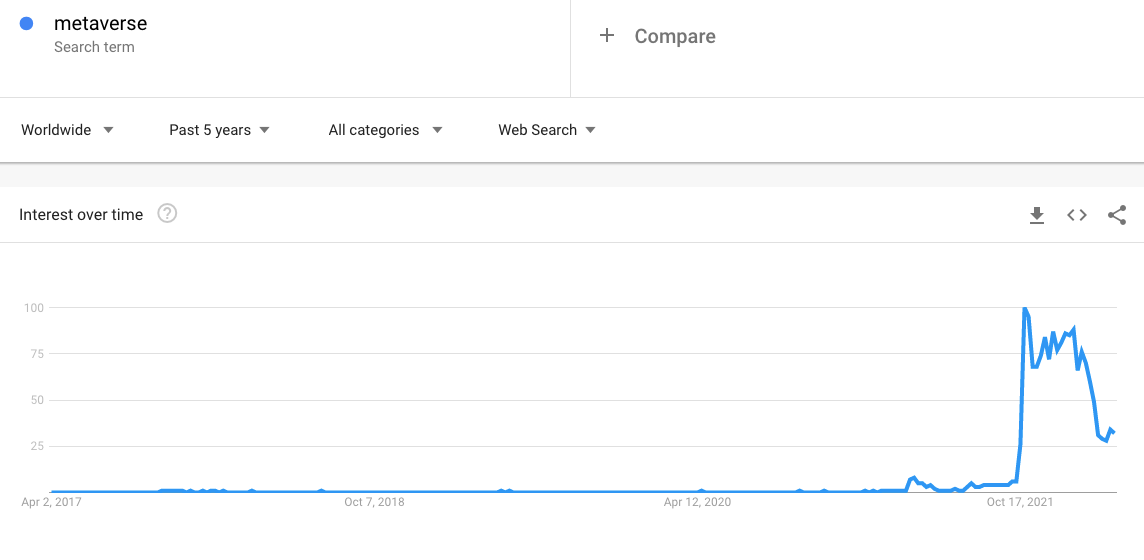What the Hell is The Metaverse?

You have probably been hearing the word ‘metaverse’ more and more lately. It seems to have become a something of a ‘trending topic’ over the last year or so. While the term itself dates back to 1992 when author Neal Stephenson introduced the concept in Snow Crash as a partly satirical and dystopian warning about a world that most of us hope is not about to emerge. Then in 2011 the concept re-emerged as Ernest Kline’s Ready Player One introduced viewers to the OASIS, an escapist metaverse where a deteriorated civilization spends most of its time and energy.
Over the last few years our own worlds were turned upside down by COVID-19 and many of us found ourselves much deeper in digital landscapes that, while not exactly virtual worlds, made engaging with others, both personally and professionally, a part of everyday life. It is no surprise that this situation, as well as the incredible advancements in technology, have made the concept of ‘the metaverse’ seem extremely relevant and in some ways inevitable.
There’s some trouble with the term though, it seems that it is among the polysemic words in our language that mean different things to different people. I was in a meeting the other day talking about the upcoming launch of the BlackBoxxcelerator with Soaring Cities !P and Florida Blue. (On Friday April 1st, just before the ribbon cutting, they will be hosting a breakfast discussion with Rony Abovitz and Guy Gilliland entitled “Building the Metaverse City.”) While discussing the event someone on the call said “yeah, and I hope they start by defining what 'metaverse' means!” It’s unlikely though, because as far as we can tell, almost everybody means something different by the term. Perhaps it would be good for such a conversation to lay out a definition for the specific dialogue, a kind of defining our terms, so that even while that might not be universally applicable, everyone in the room has an understanding of what, specifically, is being discussed.
There are a lot of words like this. “Romance” for example might mean a steamy sexual novel to one person, a date with dinner and roses to another, and to someone else a linguistic category, yet to another an unfair relational expectation. Metaverse seems to belong to a class of words that are open to connotation, subjective interpretation, abstraction, and ambiguous meaning. This might also be why some scoff and recoil at the mere mention of the word, others lean in with intrigue, but few, if any, can say they know what exactly we are talking about.
While we are not audacious enough to claim to be able to settle the ambiguity here, what follows will explore some of the etymological and epistemological connotations, stack up the plethora of possible meanings, and try to offer a framework that allows us find the value of the concept, deal with the term's versatility, and explore the world that is emerging with a greater sense of wonder and appreciation.
First, we need to deal with the prefix μετά. In Greek, the prefix means “after” or “beyond.” It is often used to mean transcending. Its earliest Mycenaean Greek form me-ta is actually cognate with the Old English preposition mid, meaning “with” as in the word midwife. Meta can mean "after", "beside", "with", "among" "beyond" or "adjacent." In Greek these meanings were often distinguished by case markings but it is not hard to see how translation might be a challenge at times. In origin, Metaphysics was just the title of one of the principal works of Aristotle; it was named by Andronicus of Rhodes, who compiled The Philosophers works. He gave Metaphysics this name to indicate its place in the series he compiled. Namely after or following Physics. It is basically called “The book that comes after physics.” Incidentally, in that text Aristotle deals with questions of wisdom, the existence of God, first principles, and other considerations that are above, or transcend the physical world. Later interpreters would understand the title, Metaphysics to mean “what is beyond the physical” or what “transcends it.” This would forever shape the use of the word which has been preserved right into modern day english.
In epistemology, the term is used to mean about (its own category). For example, metadata is data about data. Meta-cognition is cognition about cognition. A Meta-rule is a rule about rules.
The -verse part is a little tough to trace back as even our term Universe is derived from uni, meaning one and vertere, meaning to turn or be turned. (as in convert) It is not totally clear how when put together these have come to mean universe, as in everything in existence, or universal as in relating to everything, but that is what it means. Probably it is somehow related to versatility, or many, a diversity united, or made one. This seems to be what William James understood it to be when he contrasted it with the word multiverse.
Truly all we know of good and beauty proceeds from nature, but none the less so all we know of evil. Visible nature is all plasticity and indifference, a moral multiverse, as one might call it, and not a moral universe.
[William James, "Is Life Worth Living?" May 1895]
Does any of this help us understand the term Metaverse? Does it mean: about the universe, after the universe, above the universe, or maybe with, alongside, and adjacent to the universe?
If we allow common usage to guide us we might conclude that it is just another way of saying VR or augmented reality. Facebook recently changed its name to “Meta” and is leaning heavily into Oculus VR headset technology and developing virtual reality experiences. Is that the metaverse? Often you might hear people say ‘a metaverse’ by which they mean this VR platform or that VR platform although if meta means anything it almost definitely means transcending all of these, right?
For what follows, we want to ask you to set aside any ideas you might have about what the word means. Forget for a second, any images of 3D environments with avatars or scenes from The Lawnmower Man. In fact we want to suspend for a minute the terms virtual (as in virtual reality) and real (as in real life). The virtual/real dichotomy often pits worlds against one another, at least in our minds and is often an unhelpful frame for reflection. Instead we want to simply recognize that we live in physical space as well as digital space. Though sometimes these spaces might come into conflict, (like taking our eyes off the road while driving for example) they are most often collaborating mutual spaces that can both be quite real and quite good.
Think about this.
Has your life become more or less digital?
When is the last time you wrote a physical letter, by hand?
How much of your communication has become digital?
(email, text, zoom, etc.)
What about your organizational tools? (calendar, notes, etc)
How about your payments and money?
(credit cards, venmo, cashapp, online payments, crypto, etc)
What about entertainment? (youtube, hulu, netflix, etc)
People often react viscerally to this reality and make some value judgment about it as if physical and digital need to be in competition. Again, this isn’t virtual versus real, its digital and physical interacting and often enhancing each other. The digital plays the music, sets the temperature, schedules the delivery, and the physical is documented and shared with others in social spaces in Web2 platforms. We don’t need to put on VR headsets to have the same experience from different places anymore than we need them to have different experiences in the same physical location. We are doing that already with our phones and computers. We have already chosen to embrace a digital universe.
One thing that Metaverse might allude to is the mental divide we place between the physical and digital. We already operate in both spaces and perhaps the idea of meta, is that we transcend the distinctions and no longer think about one as real and one as virtual or fake. Every year that goes by computers are becoming more aware of the physical world around them. Just think about all the ways you interact with the digital world in physical space. Many of you use facial recognition to unlock your computers or phones, others use fingerprint detection. Voice devices like Alexa and Google Home are becoming more and more common. It is possible to cool your house and change what song is playing by simply shouting to your computer. This ability to be aware of the world is making so many more interactions possible. From self-driving cars to smart home devices that will notify you when someone walks through your yard, the physical and digital worlds have been slowly bridging and many of our lives have been enhanced because of it.
So isn’t this supposed to be a series about Web3? How is any of this related to the Rabbit Hole we have been going down together? Good Question. There is an extremely important element of blockchain technology that is making this gradual shift become sudden. It is now possible to have real, immutable, and decentralized digital identity. It is also now possible to actually own digital property. This development adds a settlement layer of truth to the digital world that has never before been possible. Perhaps it was possible for your kids to buy digital skins on Fortnite but all of those ‘assets’ exist on the companies centralized servers and cannot be withdrawn to take into another game. They are not 'meta'. They are just features in a game. With the rise of blockchains like Ethereum that have the ability to create a registry of non-fungible items, it has become possible to take your NFT assets with you from one platform to another. This is why it doesn’t work to say “a metaverse” as if there are many metaverses. There are many games, and many VR experiences, and there are many centralized servers, but what Web3 is making possible is THE metaverse. What the metaverse cannot be, is centralized. A centralized metaverse isn’t a metaverse, its a video game or VR experience. The ownership and governance made possible by the decentralized structure of blockchain technology is what is leading to the emerging, shared, collaborative, ownership economy and the creation of the Metaverse.
Ok so it’s not just VR? Then what is “The Metaverse?” We would like to offer you a slight shift in the question. The Metaverse is not a digital or physical thing. It is not a thing among other things. It is a point in time, an emerging era, a paradigm shift. It is as significant as the agricultural or industrial revolution, as consequential as the printing press or the internet itself. There is a new day dawning and there is so much new territory to be explored? It is already here and you are already familiar with it. It is also still emerging and all of us will be in awe of what's coming.
Oh and PS, VR is cool and an important part of what's coming. If you do get a chance to cop a headset, social VR is where it's at! Games are awesome and so are 360 videos but the ability to meet and engage with others in a 3D context is the most obvious and valuable use case. Just like zoom gave us access to one another while sheltering in place, VR social experiences are, in time, going to make zoom feel like old school land line telephones.
